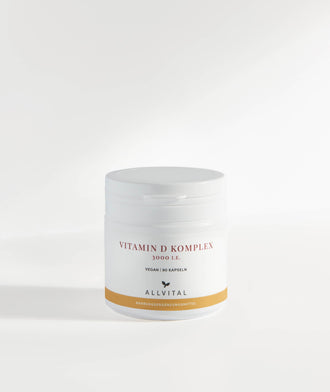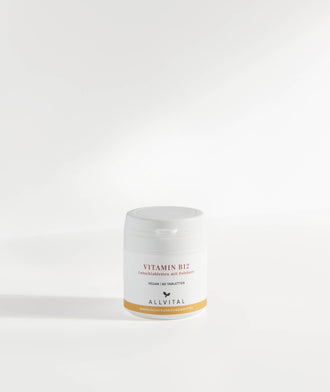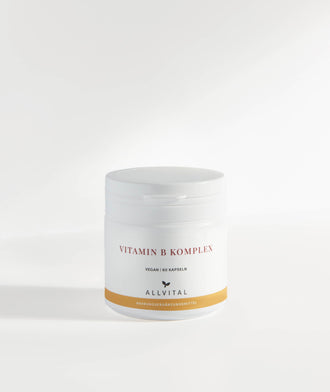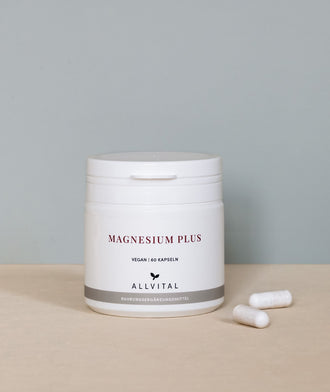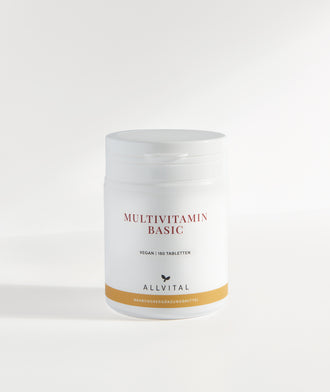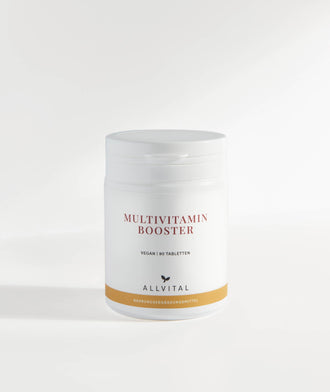
Dietary supplements: Myths, facts and practical tips
More and more people are turning to vitamins, minerals, and other dietary supplements to actively support their health.
At the same time, critical voices are growing louder: Are these products really necessary—or just a waste of money that ends up as expensive urine? What’s the truth behind the common prejudices and myths?
More and more people are taking supplements
For many, taking dietary supplements has become a daily habit. According to recent surveys, more than 75% of Germans regularly use products like vitamin D, magnesium or omega-3 fatty acids (1).
In this article, we’ll debunk common myths, explain the scientific background, and show what really matters when it comes to supplement use.
Myth 1: “A healthy diet provides all the nutrients you need”
In theory, it makes sense: “If you eat a healthy diet, you don’t need additional vitamins or minerals. Nature didn’t intend us to take pills.” But in reality, things are different today.
Our food no longer contains the same levels of micronutrients it once did. Intensive farming practices, depleted soils, and crops bred for speed and yield come at a cost: nutrient levels are declining.
A 2004 study by the University of Texas found that in 43 types of vegetables examined between 1950 and 1999, there were significant declines in vitamin and mineral content (2). On top of that, long transport and storage times, as well as industrial processing, lead to further nutrient losses.
Modern lifestyles also impact nutrient needs: stress, exposure to environmental toxins, lack of sleep and certain medications all increase the body's requirement for micronutrients. So while our need for nutrients rises, the amount in our food is dropping.
Myth 2: “Supplements are dangerous”
As with everything in life: the dose makes the poison. Improper use can indeed become a problem – especially if fat-soluble vitamins like A and D are significantly overdosed over a longer period of time.
Some nutrients can also interact with medications. A well-known example is vitamin K, which can interfere with certain blood thinners like warfarin. Anyone taking medications long term should consult their doctor before starting supplements.
The biggest risk, however, comes from low-quality products. Buying cheap supplements online or at drugstores can lead to:
- contamination (e.g. heavy metals),
- underdosing that renders the product ineffective,
- unwanted additives that may harm your health.
For the safe and effective use of dietary supplements, it is important to choose high-quality products, regularly monitor your lab values, and consult a healthcare practitioner regarding the selection and dosage of supplements if you are taking medication.
Myth 3: “Supplements don’t work”
Anyone claiming that supplements are ineffective is ignoring the growing body of scientific research and the countless therapy successes seen in holistic practices. A simple PubMed search for “omega 3” yields over 40,000 study results. Many micronutrients have now been tested in human clinical trials, showing beneficial effects across a wide range of health conditions.
Myth 4: “Just expensive urine”
Water-soluble vitamins like vitamin C and the B-complex are—like many medications—partially excreted in urine after absorption in the body. Some people interpret this as a sign that the supplements are useless. Especially when urine turns bright yellow—a result of vitamin B2 (riboflavin)—many assume the body has simply flushed the product out.
But the opposite is true: excretion proves that the vitamins were absorbed in the gut, entered the bloodstream, and were transported to the cells. The kidneys naturally excrete any excess of water-soluble vitamins—just as they do with components from food or medications. Since our blood is constantly filtered by the kidneys, some level of excretion always occurs, even when the dosage of a supplement is low. So the coloured urine doesn’t mean the supplement was overdosed—it’s a normal physiological response.
Myth 5: “Synthetic is bad”
Many people are sceptical of supplements once they hear that most products are synthetically produced. What’s often overlooked is that these substances are usually exact replicas of the natural molecules—biochemically identical and utilized by the body in the same way.
The majority of modern micronutrients are produced through methods like fermentation or chemical synthesis. These techniques allow for a stable, pure, and precisely dosed end product.
At Allvital, we deliberately focus on quality and balance. Many of our products combine high-grade synthetic ingredients with natural plant extracts, which deliver nutrients in their natural matrix—often including beneficial compounds like phytonutrients, enzymes or cofactors that further support absorption and effectiveness in the body.
So synthetic doesn’t mean inferior. What really matters is the quality of production, bioavailability, and the thoughtful combination of ingredients.
Myth 6: “I don’t feel anything, so it’s not working”
Many expect supplements to produce immediate results—similar to a painkiller. But micronutrients primarily work behind the scenes: they support metabolic processes, strengthen the immune system, protect cells from oxidative stress, and aid regeneration.
These processes usually occur unnoticed, and it can take weeks or even months before symptoms noticeably improve.
Myth 7: “Supplements are only for the sick or elderly”
A common misconception is that supplements only make sense when a deficiency already exists or health is declining. In reality, it’s far better to support the body consistently, so it doesn’t fall into deficiency in the first place.
Especially during times of high stress, intense physical activity, cold and flu season, or during pregnancy and breastfeeding, it’s wise to give the body additional support with key nutrients.
Which supplements are especially important?
The type and dosage of micronutrients that make sense can vary from person to person and change throughout life. Still, there are a few nutrients that have proven particularly important for many people in practice—and are ideally taken on a long-term basis:
It is also advisable to take a comprehensive micronutrient complex that includes all essential minerals, trace elements, and vitamins. Our Multivitamin Basic and Multivitamin Booster products are well suited for this purpose.
How to take supplements correctly
For supplements to work effectively, proper intake is key. A few practical guidelines:
- Fat-soluble vitamins (such as A, D, E, K) and fat-soluble substances like carotenoids or curcumin should always be taken with a meal containing some fat—this is essential for proper absorption.
- Amino acids are best absorbed when taken on an empty stomach, ideally about 30 minutes before a meal.
- The right time of day matters: B vitamins are energizing and best taken in the morning. Magnesium, on the other hand, can have a calming effect and may help improve sleep when taken in the evening.
- Smart combinations: Some micronutrients enhance the absorption of others and are therefore ideal in combination—for example, vitamin C and iron, or vitamin B6 and magnesium. Allvital products include many of these synergistic combinations to optimize absorption and effectiveness.
Who monitors quality and safety?
By law, supplements are classified as food—not as medicine. This means they are not subject to official approval or standardized efficacy testing. The responsibility for product safety lies entirely with the manufacturer and distributor.
In Germany, supplements must be reported to the Federal Office of Consumer Protection and Food Safety, but this is only a formal registration. Actual checks are carried out by the food safety authorities of the individual federal states, and these are conducted only randomly.
The challenge: There are no uniform testing standards, and not all manufacturers follow the same quality practices. That’s why it's important to choose products from trustworthy companies that can demonstrate their quality through independent lab testing, verified raw materials, and transparent manufacturing processes. Only then can you be sure the supplement delivers what it promises.
Conclusion: Targeted supplementation supports health
Supplements are no substitute for a healthy lifestyle—but they are a valuable tool to support the body in staying well.
What matters is a conscious approach:
- Identify actual needs instead of supplementing randomly
- Prioritize quality over quantity
- Consider individual factors such as diet, lifestyle, stress, and age
Those who stay informed, choose high-quality products, and tailor their intake to their personal needs can benefit from supplements in the long run.
Sources:
- Brandt M. Wie verbreitet sind Nahrungsergänzungsmittel in Deutschland? Statista [Internet]. 20.11.2023; [aufgerufen am: 24.05.2025].
- University Of Texas At Austin. "Study Suggests Nutrient Decline In Garden Crops Over Past 50 Years." ScienceDaily. ScienceDaily, 3 December 2004.


